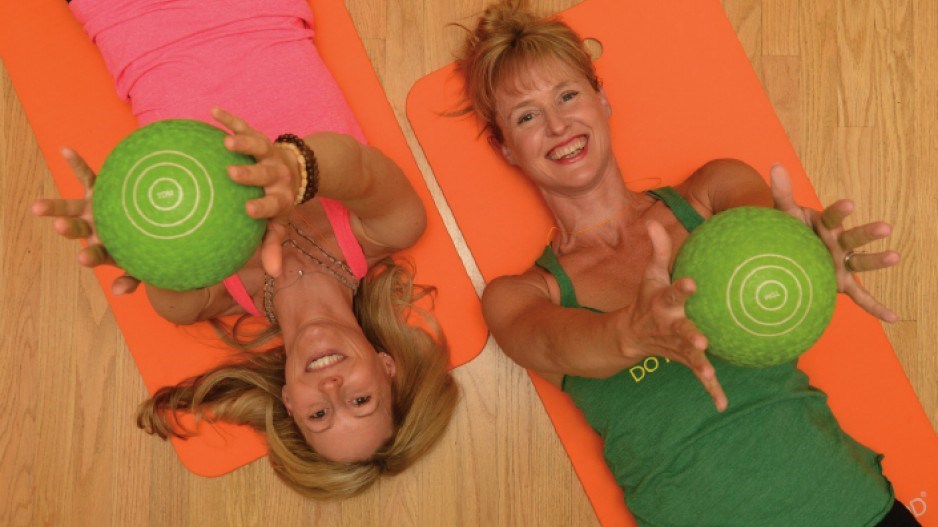Company Name: The Dailey Method studio
Principals: Karen and Jey Wyder
Location: 3584 West 41st Avenue
Business venture: A local franchise for a ballet barre workout studio chain that originated in the United States
History: Karen Wyder was a senior manager at Lululemon Athletica travelling around the United States opening branches of the yogawear giant when she discovered the emerging exercise trend of ballet barre workouts. The workout routine was becoming increasingly popular in larger markets such as New York, Chicago and L.A., but Wyder noticed that there was nothing like it in Canada.
She discovered the Dailey Method, a chain of barre exercise studios that now has 48 locations in the U.S., Canada and Europe, and noticed what she described as the "transformative" results seen in both the staff and clients.
She shared her discovery with her sister, Jey Wyder, who was instantly hooked.
The sisters wanted to bring the Dailey Method to Vancouver, but they didn't just jump in and rent a studio. They decided instead to build up the brand's profile around the city by teaching Dailey Method classes without establishing a fixed location.
"We rented church basements and we taught out of Lululemon stores and created some excitement and introduced clients to the method," said Karen. "When we opened our doors we had over 1,000 clients."
That was in 2010, and the clientele at their 2,000-square-foot studio in Dunbar Village has since tripled.
The sisters attribute this success in part to the sense of community they bring to the studio.
"When we started our business, we just got really firm about what we wanted to do and we wrote our values," said Jey. "Our No. 1 thing was that we wanted to be of service to our community, so we always come back to that and people just say over and over again that that's what they feel when they come into the studio.
"They feel it's more than just a place to work out."
For the Wyders, working in the community takes the form of partnering with local businesses such as The Juice Box and getting involved with local fundraising. They also have relationships with neighbourhood physiotherapists and Lululemon.
More than anything, however, Karen, 39, and Jey, 49, believe their success comes from the method itself.
"I've done everything," said Karen. "I had a personal trainer, I was running, I was kick-boxing, and it was the Dailey Method that transformed my body.
"So it kind of speaks for itself."
Most of their clients are women between the ages of 30 and 50 (although they said male clients make up about 2% of their membership), but they say it's safe for people of any age because it's non-impact. Their mother, who is in her 70s, works out at the studio.
Challenges
Working closely with a family member has its advantages. Karen and Jey say they have a strong sense of trust, and they know they have each other's best interests in mind – but there are difficulties inherent in this relationship as well.
"The challenge is just getting really clear about what our boundaries are and also what the roles are, getting beyond the family relationship and really defining our roles and being objective about that," said Jey.
The sisters say their uncle, David Bentall, was instrumental in helping them get beyond these issues. Bentall, the grandson of real estate magnate Charles Bentall of the Bentall Group, is a family business consultant and the author of Leaving a Legacy: Navigating Family Business Succession.
"He was really instrumental in helping us say, 'For this role that you've designed here, what is the market value for this role?'" said Jey.
"We know each other and everything but then having to sort of depersonalize it to get really objective. That was really hard to do."
Analysis
Mary Charleson, president of marketing consulting company Charleson Communications, said the sisters' choice to pre-brand before establishing a studio was a distinctive way to differentiate themselves.
"From a retail environment, it's not unheard of to enter the market in a way that will not ultimately be their final form in terms of distribution," she said, giving the example of a retail pop-up store.
But what is particularly interesting, she said, is that what is being marketed is a service, rather than a physical product – something she had not heard of being done before.
Charleson said the way they chose to pre-brand – by offering classes in church basements – was smart. "It implies that it's potentially very community-based as part of their branding, almost kind of like a 'back-to-basics' kind of approach." •




